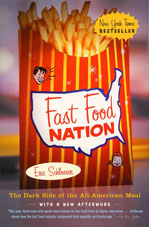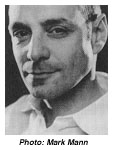|
 Fast
Food Nation by Eric Schlosser Fast
Food Nation by Eric Schlosser
Fast food
has hastened the malling of our landscape, widened the chasm between
rich and poor, fueled an epidemic of obesity, and propelled American
cultural imperialism abroad. That's a lengthy list of charges, but
here Eric Schlosser makes them stick with an artful mix of first-rate
reportage, wry wit, and careful reasoning.
Schlosser's
myth-shattering survey stretches from California's subdivisions
where the business was born to the industrial corridor along the
New Jersey Turnpike where many fast food's flavors are concocted.
Along the way, he unearths a trove of fascinating, unsettling truths
-- from the unholy alliance between fast food and Hollywood to the
seismic changes the industry has wrought in food production, popular
culture, and even real estate. He also uncovers the fast food chains'
disturbing efforts to reel in the youngest, most susceptible consumers
even while they hone their institutionalized exploitation of teenagers
and minorities.
|
Eric
Schlosser is a correspondent for The Atlantic Monthly. He has
received a number of journalistic honors, including a National Magazine
Award for an Atlantic article he wrote about marijuana and the war
on drugs. This is his first book.

|
|
|
Carl
N. Karcher is one of the fast food industry's pioneers. His career
extends from the industry's modest origins to its current hamburger
hegemony. His life seems at once to be a tale by Horatio Alger,
a fulfillment of the American dream, and a warning about unintended
consequences. It is a fast food parable about how the industry started
and where it can lead. At the heart of the story is southern California,
whose cities became prototypes for the rest of the nation, whose
love of the automobile changed what America looks like and what
Americans eat.
Carl
was born in 1917 on a farm near Upper Sandusky, Ohio. His father
was a sharecropper who moved the family to new land every few years.
The Karchers were German-American, industrious, and devoutly Catholic.
Carl had six brothers and a sister. "The harder you work," their
father always told them,, "the luckier you become." Carl dropped
out of school after the eighth grade and worked twelve to fourteen
hours a day on the farm, harvesting with a team of horses, baling
hay, milking and feeding the cows. In 1937, Ben Karcher, one of
Carl's uncles, offered him a job in Anaheim, California. After thinking
long and hard and consulting with his parents, Carl decided to go
west. He was twenty years old and six-foot-four, a big strong farm
boy. He had never set foot outside of northern Ohio. The decision
to leave home felt momentous, and the drive to California took a
week. When he arrived in Anaheim -- and saw the palm trees and orange
groves, and smelled the citrus in the air -- Carl said to himself,
"This is heaven."
Continued...
Next
HarperCollins Publishers.
Used by permission.
Above Text © 2002, HarperCollins Publishers.
|


 Fast
Food Nation by Eric Schlosser
Fast
Food Nation by Eric Schlosser